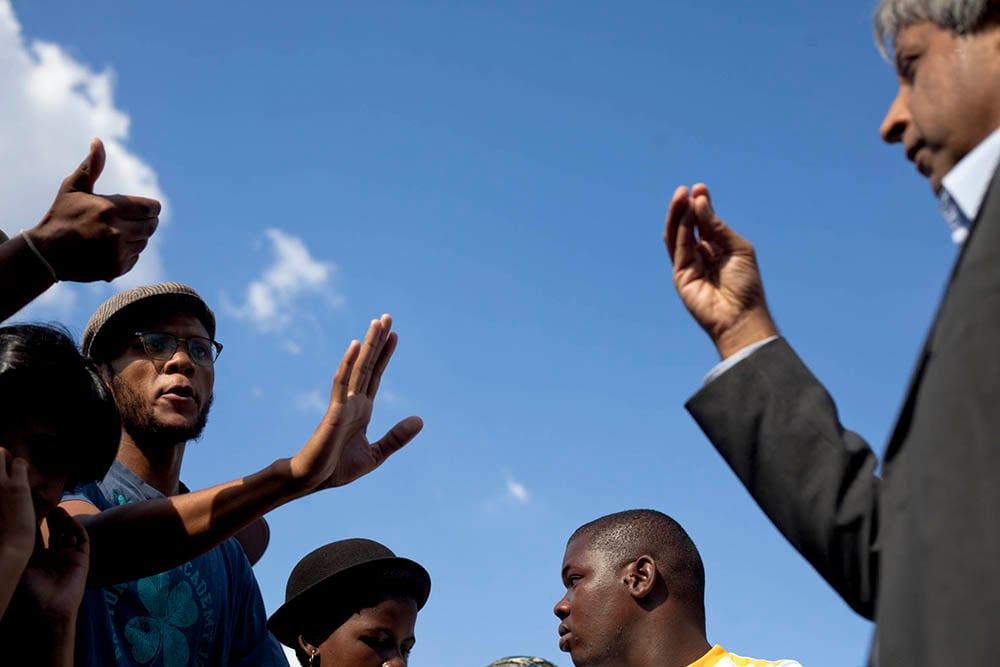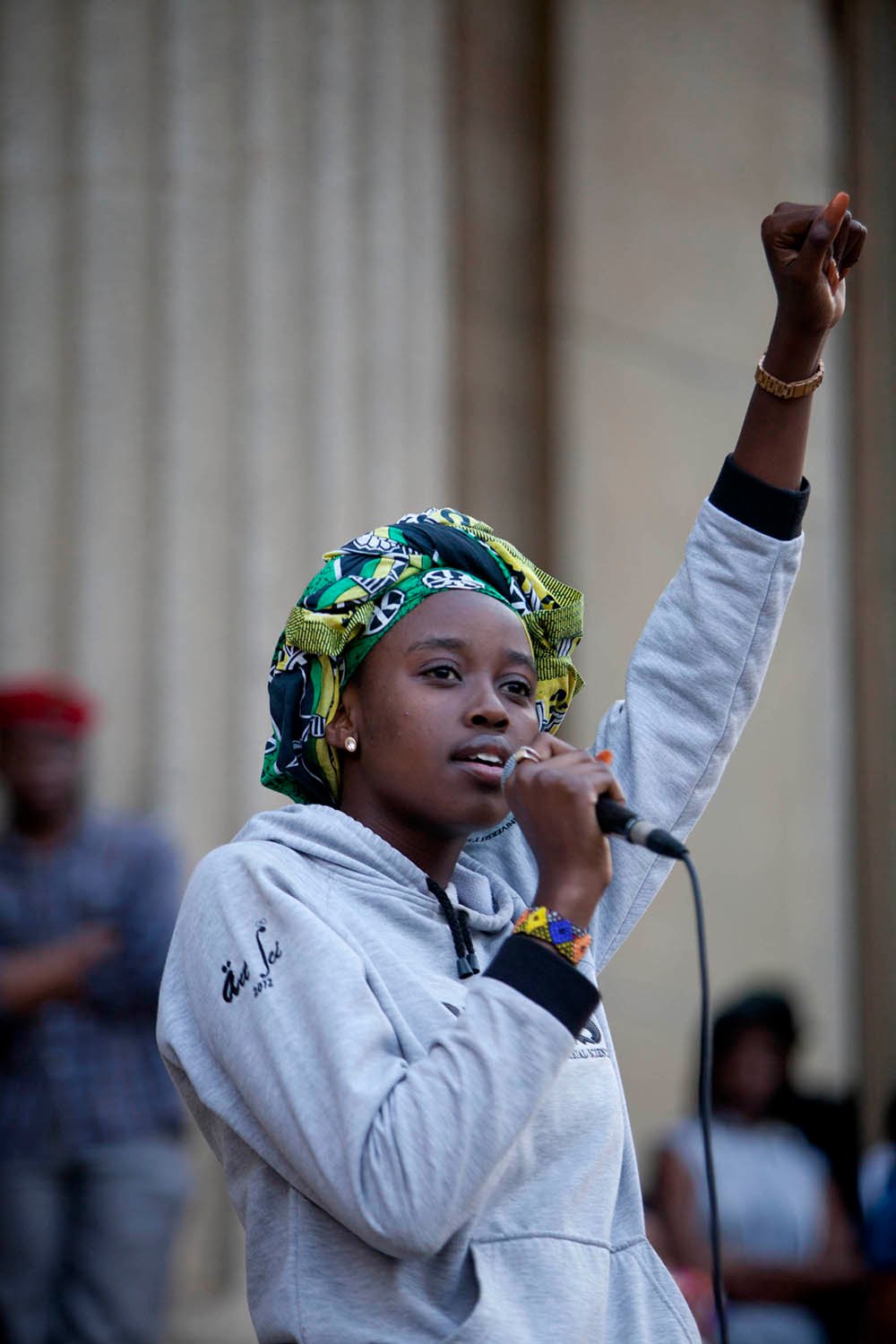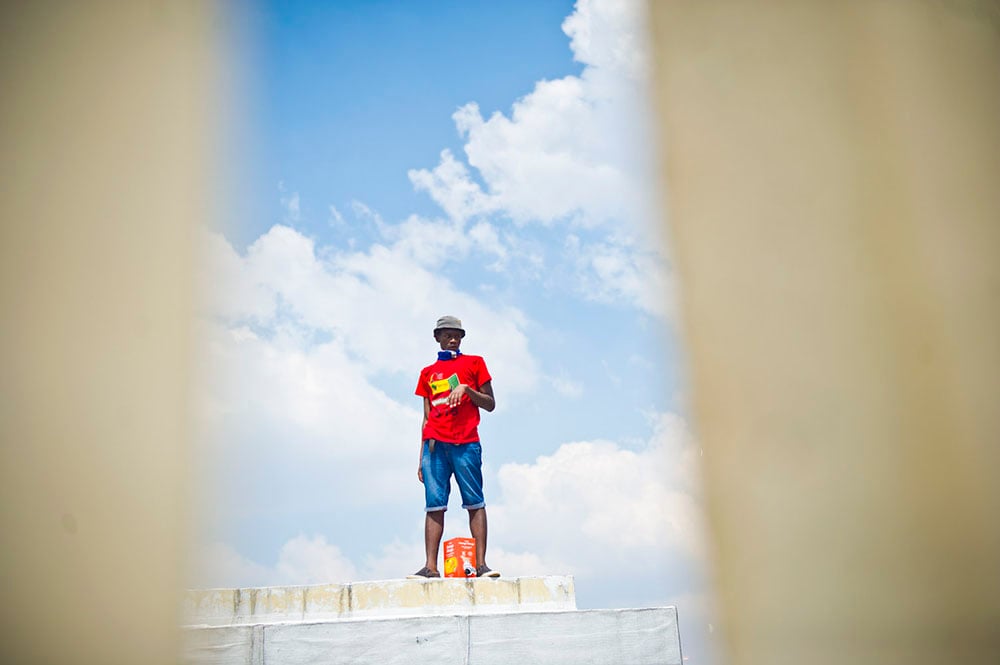Wits students returned early from the holidays to continue the protests over fees.
The #FeesMustFall protests of 2016 have seen a sharp increase in mistrust and paranoia among protesting students, and especially among those leading the various dissenting groups, as political parties and factional interests jostle to influence the movement.
Tension between the independent #FeesMustFall movement and elected student representative councils (SRCs) has made negotiations with management troublesome, as some students insist they will not allow normal teaching to continue this year until a number of their demands have been met.
Many of the students involved in the protests insist that political tensions will not derail the movement, but politics – and unexpected power exercised in unexpected ways by sometimes unexpected leaders – has been at the root of the protests from the start.
This timeline identifies the key moments in the protests.
October 14 2015
What was meant to be a two-hour protest about a projected 10% increase in tuition fees at the University of the Witwatersrand starts off with a handful of students blocking entrances to the campus. By noon, Wits students successfully shut down the university and demand that management declare there will be no fees increase in 2016. The students are largely seen as violent and a threat to the safety of nonprotesting students and staff.
October 15 2015
Students barricade entrances on the second day and ANC T-shirts are handed out by party members, causing some disagreement in a group that had already declared itself nonpartisan. “Whoever was there to give out T-shirts at the Empire [Road] entrance [to the main Wits campus] made me uncomfortable. I saw this as a clear demonstration that the PYA [Progressive Youth Alliance]-affiliated students wanted the ANC to be visible in the protests,” says Wits student Thabiso Bhengu.
October 16 2015
After a two-day shutdown of Wits, vice-chancellor Adam Habib returns from the Higher Education Summit to hear the students’ demands. Outgoing and incoming SRC presidents, Shaeera Kalla and Nompendulo Mkatshwa respectively, are snubbed and sidelined by students, triggering a debate on issues of gender and patriarchy. Among those accused of being at least complicit in the poor treatment of the two women – perhaps because of their personal political ambitions – are former Wits SRC president Mcebo Dlamini and Economic Freedom Fighters Student Command leader Vuyani Pambo.
In the early hours of Saturday morning, the Wits executive committee signs a binding agreement that it will return to the university’s senate to ensure that there is no fee increase in 2016.
October 19 2015
Despite a written agreement to do so, the Wits executive committee fails to arrive to give students feedback on the senate meeting.
Students at the University of Cape Town start protesting against the proposed fee hike and student movements from various other universities start planning their own protests, promising a national shutdown.

A sit down protest against the arrest of University of Cape Town students. (David Harrison, M&G)
ANC supporters Kalla, Mkatshwa and Dlamini, and Pambo of the EFF, become prominent figures in the Wits #FeesMustFall movement, which in turn draws the majority of public attention. The four are pictured together in their different political colours, giving the impression that partisanship has been put aside in pursuit of a mutual goal.
October 20 2015
After meeting with university vice-chancellors, the higher education and training minister, Blade Nzimande, announces that fees will only be increased by 6%. Students reject Nzimande’s offer and continue to protest.
Bones Modise, provincial secretary of the ANC Youth League in Gauteng, and other party officials try to march with students who set off from the Wits education and medical campuses in Parktown but are prevented from being in the front line of the march. Pambo describes their attempt as “opportunist”.
October 21 2015
As Finance Minister Nhlanhla Nene is scheduled to deliver his mini-budget speech, thousands of students from Western Cape universities take their protest to the gates of Parliament, where they clash with police and private security guards.

EFF student command leader Vuyani Pambo and Wits vice-chancellor Adam Habib. (Oupa Nkosi, M&G)
At Wits, prominent Gauteng ANC member Buyi Majola gives a talk to students as a show of support. Some students complain about her presence, but are told she is there in her capacity as president of the African Education Governors Association of South Africa and not as an ANC representative.
October 22 2015
University of Johannesburg (UJ) students join in the increasingly national protests and shut down their Auckland Park campus. A group of UJ students attempt to march to the ANC’s national headquarters, Luthuli House, in downtown Johannesburg, but are stopped by a police barricade on the Nelson Mandela Bridge in Braamfontein. Kalla and Mkatshwa arrive at the barricade and attempt to persuade students not to march on the ANC building.
A former Wits SRC member, who wants to remain anonymous, says that on the same day he “got a call [from an ANC official] who called to ask if we were coming there [Luthuli House] and I said yes. He said that we cannot march to Luthuli House.”
Many student protesters were opposed to the idea of marching to Luthuli House, the former SRC member added, especially because the march was championed by the EFF students in the movement.
“Politically, it doesn’t look right for Vuyani [Pambo] to lead the march to our headquarters. We had to agree to the march but we made sure that we were also on board,” he added.
After a tense meeting the Wits student protesters at Senate House [unofficially renamed Solomon Mahlangu House by the students in honour of the Umkhonto weSizwe soldier hanged by the apartheid regime in 1979], the majority agrees in favour of marching to Luthuli House.
The police, who resisted the students’ earlier attempts to march on the ANC headquarters, now escort them. The deputy higher education and training minister, Mduduzi Manana, joins the march and later some members of the ANC Youth League Gauteng executive committee also join in.

Wits SRC president Nompendulo Mkatshwa. (Oupa Nkosi, M&G)
At ANC headquarters a memorandum is read and handed over to the party’s secretary general, Gwede Mantashe. Pambo, the only leader of the protest movement who is not affiliated to the ANC, demands that Mantashe sit down to listen to students as Habib had famously done in a previous meeting with the group. The demand is met with lots of contention from students.
A large number of students head back to their respective campuses but a small group of Wits students are pepper-sprayed by police when they insist on occupying the Luthuli House doorstep.
In a media briefing inside the building, Mantashe says the march to Luthuli House should not be seen as a march against the ANC and calls for ANC members to join the students’ protests.
“If students decide to march to Luthuli House we won’t run away,” Mantashe says. “But it would be incorrect because ANC does not set fees. Today we will meet with our own organisations, the [Progressive Youth Alliance, comprising the South African Students Congress, the ANC Youth League, the Young Communists League and the Congress of South African Students]. We don’t want to hijack the process.”
Students would later express dissatisfaction with the handling of different aspects of the march, saying Dlamini handled Mantashe with kid gloves compared with his approach to Habib.
Many students would later cite the march as the moment they started to suspect the movement had been compromised by party politics. One former Wits SRC member says the march was the start of tension between ANC leaders and the group.
Dlamini says communication between Wits Progressive Youth Alliance-affiliated students and ANC headquarters were limited to informing the party that the students were on their way so that they could be received. Dlamini and Kalla say they were not contacted by any ANC official to tell them not to march to Luthuli House.
October 23 2015
Thousands of students gather at the Union Buildings in Pretoria to hear the outcome of a meeting between President Jacob Zuma and various university management and student leaders. Tensions mount as students question the mandate of the leaders in the meeting, and how those leaders were selected. Kalla declines to take part in the meeting; she later confirms that a member of government, whom she declined to name, called her to ask why the Wits SRC did not want to take part in the meeting.
Students also question who paid for the buses used to ferry them to Pretoria, with rumours of a “third force” seeking to direct events. Kalla said this week that, to her knowledge, the buses were supplied by individuals in their personal capacity. The South African Students Congress (Sasco) said it had been told that the National Union of Metalworkers of South Africa organised the buses.
Another source of disquiet for some students are Sasco T-shirts with “#FeesMustFall” printed on them. Some see this as proof that the ANC-aligned movement intends to hijack the protests.
Zuma announces that there will be no fee increase in 2016 to a mixed reception. Some say it is a victory; others note the goal of free education has not been met.
October 26 2015
The numbers of student protesters at Wits begins to dwindle as the ANC-allied SRC is accused of “selling out” and abandoning the struggles of outsourced workers.
After spending most of the weekend deliberating on whether the protest must continue – to insist that outsourced workers be rehired – the Wits SRC agrees that academic activities would resume the next day.

Students from the University of Johannesburg joined the protests. (Delwyn Verasamy, M&G)
Mistrust grows as ANC-allied members of the SRC and members of the Progressive Youth Alliance are found having a private meeting, and accusations of bribes and ANC interference fly.
Wits #FeesMustFall declares itself a separate independent movement on the basis that the SRC does not represent students’ interests. The independent movement is later seen as being largely made up of EFF members, leading to fresh allegations of political agendas.
November 15 2015
Destiny magazine reveals Mkatshwa as the cover of their December issue and some students complain that other leaders have been “erased” as the ANC-aligned Mkatshwa gains prominence. Kalla is also approached to appear on the cover but declines. She told the Mail & Guardian that she was not comfortable with being a face of a movement because the movement should not be represented by faces.
January 4 2016
The Wits SRC and the EFF Student Command disagree over who is responsible for organising accommodation for students returning to protest; each is adamant the other is responsible. One source would later say a power struggle was at the heart of the disagreement.
January 11 2016
Wits and UJ students disrupt the registration process, demanding free education. Some tension is evident between the SRC and the EFF-dominated #FeesMustFall movement, but they combine their protest.
January 14 2016
From the steps of Luthuli House, the Progressive Youth Alliance and other ANC-aligned organisations call for students to return to their studies.
Nzimande meets with student leaders and claims agreement on a committee to conduct further negotiations, despite a walkout by some student leaders. Mkatshwa is among those who reject the meeting as yet another talkshop.
January 18 2016
Vice-chancellors of Gauteng-based universities call on political parties and leaders to intervene to help stabilise higher education.
January 19 2016
Student leaders meet with the South African Council of Churches, which offers to help resolve the situation. Student leaders suggest that the involvement of the council shows their movement is legitimate.
January 20 2016
The EFF Student Command at the University of Pretoria claims victory, saying the university has agreed to the insourcing of all workers by 2018.
Nzimande meets 26 representatives of higher learning institutions. He says no upfront payment will be required from any student for registration.